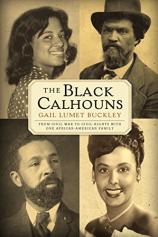The Black Calhouns: From Civil War to Civil Rights with One African American Family
Review
The Black Calhouns: From Civil War to Civil Rights with One African American Family
Gail Lumet Buckley crafts a rich and crucial historical memoir with THE BLACK CALHOUNS: From Civil War to Civil Rights with One African American Family. Born to actress and activist Lena Horne, Buckley was positioned somewhat uniquely at the crux of race and class, privilege and oppression: the extremities of wealth and the undeniable multifaceted savageries of post-Reconstruction America. THE BLACK CALHOUNS is written with the details of a journalist, the scope and context of a historian, and the intimacy of a family member. The narrative is enhanced by the presence of all three perspectives within its author.
Buckley traces her family history through the Reconstruction, the Civil Rights Movement, the Harlem Renaissance, Lena’s Hollywood days, through to Buckley’s own childhood and beyond. The narrative’s linear progression cleanly weaves the Calhoun family tree through the issues of race and anti-blackness in America, never once losing the personal connection to the characters while chronicling historical fact and emergent social justice.
"THE BLACK CALHOUNS is an engaging and immersive look into American history through one of our most notable black elite families, but it is also an intimate and affecting family portrait."
Lena experienced many privileges because of her hard work, her connected family, the wealth they enjoyed, and the beauty that passed for certain white standards --- and enchanted some of those it didn’t. Like many within the culture of her forebears, Lena was raised to lean Republican and stay away from activism. This was how the black elite survived and thrived while lynchings still threaten their bodies and livelihood --- by playing into the entrepreneurial myth of the self-made man, upon which white America establishes itself. White America capitalized on Lena’s marketability by having her perform “jungle fever” roles or singing racist tunes. Until the brutality of the era became irrefutable even for the black elite, until the war overseas highlighted the oppressions at home, Lena paid a price for her fame.
Buckley identifies her as “token,” “symbol” and “forerunner” all at once, burdening her with not only personal achievements in an oppressive system but the task of participating in the changing of that system. “They never choose us,” Lena’s Count Basie said, when Lena almost opted to leave Hollywood forever. “But they’ve chosen you. You have to go back so that other people can have your opportunities.” Buckley never shies away from the realities of her family’s history. The horrific lynchings that extended past the ’40s, the dangerous extent of the one-drop rule, the sexism and the specific, degrading oppression at the intersection of racism and sexism, misogynoir --- Buckley demonstrates how her family navigated these horrors and was still able to flourish. Lena’s triumphs ended up being groundbreaking.
Altogether, this is an essential perspective of the timeframe. Too often, black American history is represented only as slavery and civil rights movements --- and those narratives are all too often whitewashed or decontextualized to the detriment of those who still suffer the effects of America’s white surpremacist foundation. While it is abundantly crucial to educate on the truths of slavery and suffrage, we cannot neglect those within the transition --- those first families who emerged out of enslavement to shape America despite and within systemic oppression. We cannot reduce black American history to white guilt, especially when we do not use those lessons to open our eyes about the injustices committed today. Congratulating ourselves for recognizing the horrors of American slavery does not absolve us of examining racial injustice and inequality today, and it is dangerous to present these stories otherwise.
We must also recognize black excellence. We must elevate the stories of those who lived the realities of American oppression, so that we can see the variety as well as the patterns --- the many manifestations of the tragedies of white supremacy in this country, as there are multitudes more than the few white guilt/white apologism narratives that continue to emerge.
Gail Lumet Buckley’s story beautifully participates in this vital conversation. This is one of many necessary voices to emerge from this generation more recently. Perhaps seek resonance in Margo Jefferson’s historical memoir, NEGROLAND, set in Chicago but spanning the same era, and others from this intersection. THE BLACK CALHOUNS is an engaging and immersive look into American history through one of our most notable black elite families, but it is also an intimate and affecting family portrait. An essential piece.
Reviewed by Maya Gittelman on February 5, 2016
The Black Calhouns: From Civil War to Civil Rights with One African American Family
- Publication Date: February 14, 2017
- Genres: History, Memoir, Nonfiction
- Paperback: 368 pages
- Publisher: Grove Press
- ISBN-10: 0802126278
- ISBN-13: 9780802126276




